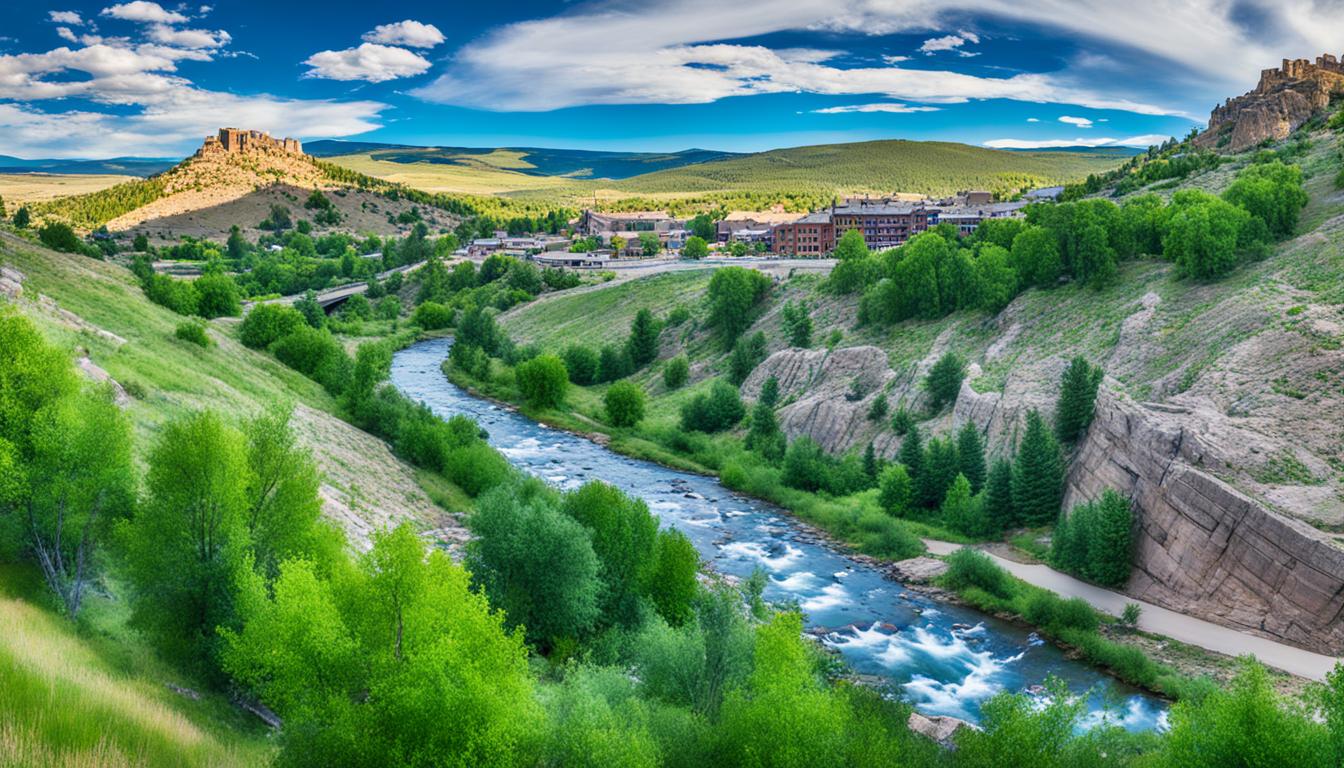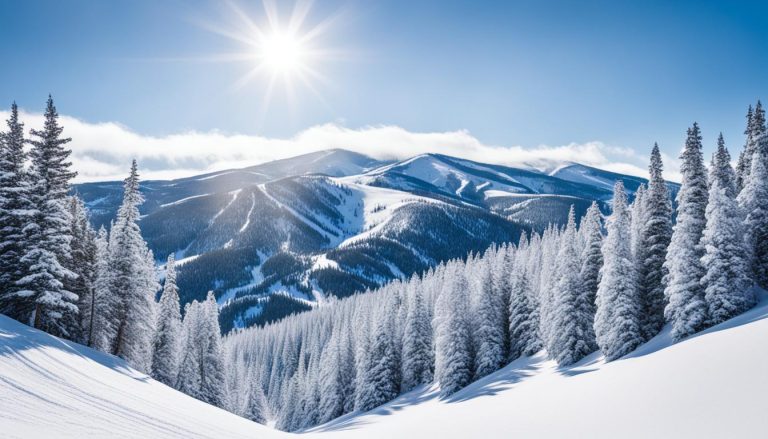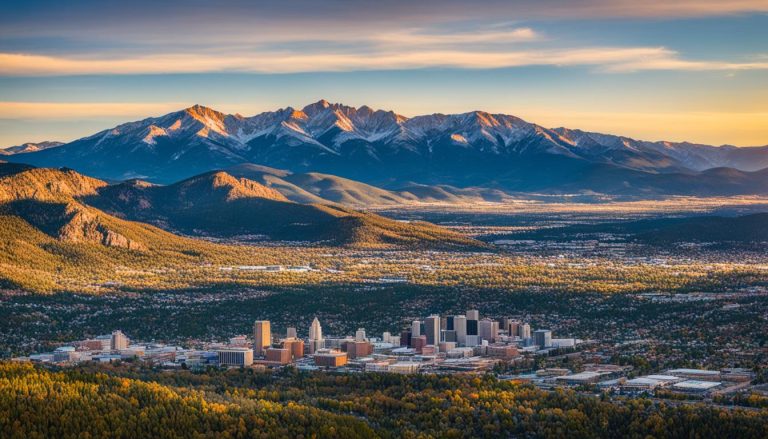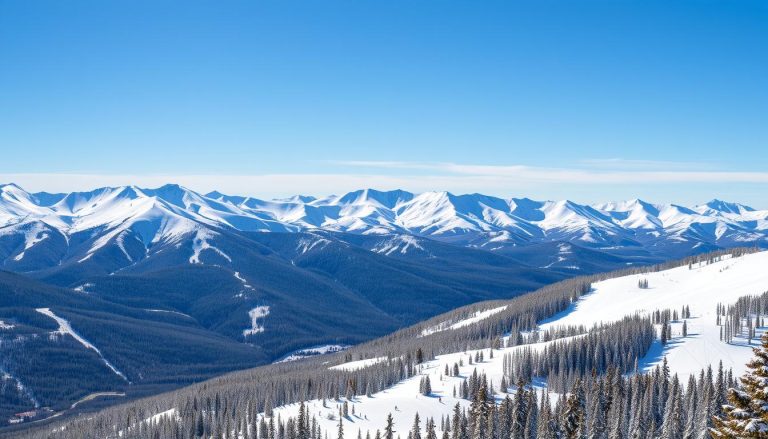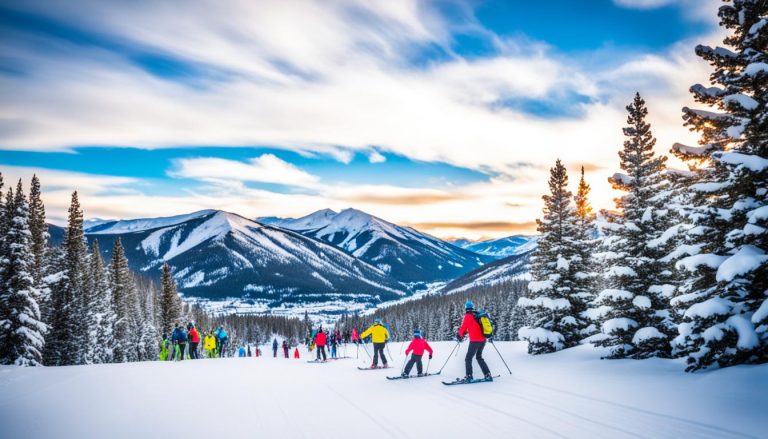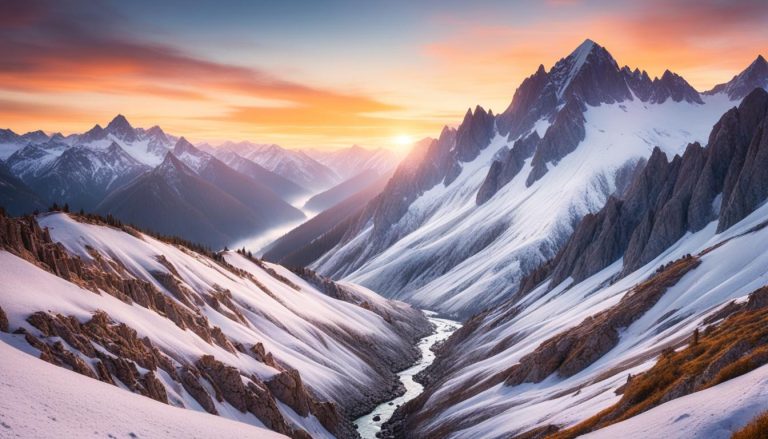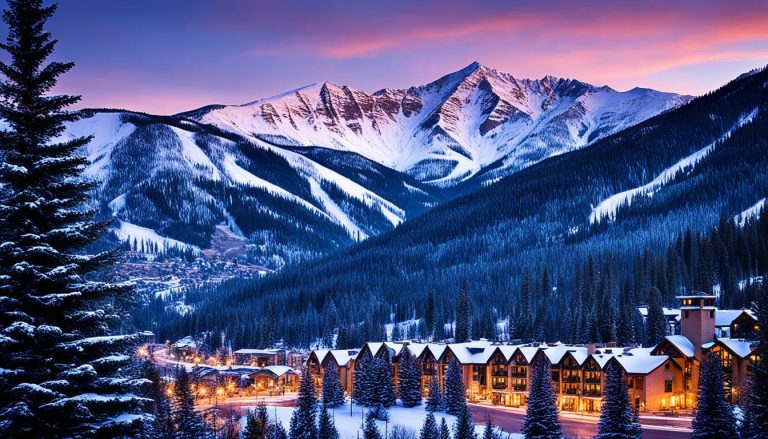Planning a trip to Castle Rock, Colorado but unsure when to visit? The region’s weather can be a puzzle. It’s diverse and changes often. However, with the right info, your trip can be perfect for what you like.
Colorado enjoys mild weather all year, but it can surprise you. In Castle Rock, you might see sudden changes in temperature, rain, and hail. These things impact the best time to go. Being prepared for the weather makes your trip to Castle Rock much better.
Key Takeaways
- Colorado has moderate weather most of the year, with quick changes.
- The area’s closeness to mountains brings different temperatures and more snow.
- In summer, Castle Rock faces intense thunderstorms and hail.
- Spring and fall have nicer weather for outdoor activities and sightseeing.
- It’s key to pack right and be ready for the weather in Castle Rock.
Finding the best months for a weather-savvy trip to Castle Rock is crucial. So, which months are ideal and how can you get ready? Let’s explore the details to find the best time for your Castle Rock adventure.
Understanding Colorado's Diverse Climate
Colorado’s known for its tough winters, but in truth, it has mild weather all year. The state’s mix of mountains, plains, and valleys causes each area to have its unique weather patterns and temperature ranges. While it’s cold with lots of snowfall in the mountains, places like Denver enjoy more moderate conditions.
Mild Temperatures Year-Round
Many think Colorado is always super cold, but that’s not accurate. Thanks to its high elevation and type of climate, the state enjoys mild temperatures throughout. This means the weather is nice for both the people who live here and those just visiting.
Regional Weather Variations
Colorado’s climate changes depending on where you are, thanks to its varied landscape. The western mountains get cold and snowy, while places like Denver have more moderate conditions. This creates big differences in temperature ranges and weather across the state.
Northern Colorado's Weather Patterns
The northern part of Colorado, including Boulder and Fort Collins, sees cooler weather and more snow. This difference in Northern Colorado weather comes from the Rocky Mountains nearby. It’s also because of the weather systems moving across the area.
Average Temperatures
Here, average daily highs reach a pleasant 65°F. Nights cool down to around 38°F. So, the typical temperature stays at about 51°F, making it not too cold in this region.
Snowfall and Precipitation
This part of Colorado gets a lot of snow, around 89 inches every year. It also gets rain, about 20 inches each year. These cool, wet conditions help keep the area green and beautiful.
| Metric | Northern Colorado |
|---|---|
| Average High Temperature | 65°F |
| Average Low Temperature | 38°F |
| Average Temperature | 51°F |
| Average Snowfall | 89 inches |
| Average Precipitation | 20 inches |
Southern Colorado's Moderate Climate
In the middle of Colorado, the southern part enjoys a more balanced climate. Cities like Colorado Springs and Pueblo have weather that’s not too hot or cold. This makes it a great place to live with moderate temperatures and good levels of rain and snow.
Colorado Springs and Pueblo
Southern Colorado sees typical highs around 62°F and lows of 36°F. This weather comes from being in between the Rocky Mountains and the Great Plains. The mountains nearby get more snow than the rest of Southern Colorado, which gets less than 39 inches a year. Rain also falls moderately, around 16 inches annually.
Temperature Fluctuations
This area can have sudden changes in temperature despite the mostly moderate climate. It’s not uncommon to go from warm and sunny to cold and windy quickly. So, it’s smart to pack clothes for changing weather and keep an eye on forecasts. This way, you can enjoy your trip to places like Colorado Springs and Pueblo more.
Eastern Colorado's Extreme Weather
Eastern Colorado is known for its wild and unpredictable weather. Living in the heart of the Great Plains means facing severe weather often. This can be tough for both locals and visitors.
Tornado Risks
During summer, Eastern Colorado sees more tornadoes. The area is flat, letting warm, moist air from the Gulf flow in. Favorable conditions for tornadoes are thus created.
People need to be ready to take cover when tornado warnings are given. This is key for staying safe.
Hail and Wind Storms
The region also gets hit by severe hail and wind storms in summer. These storms can bring hail up to softball size. Strong winds over 80 miles per hour are not uncommon.
Keeping up with weather updates and knowing where to find shelter is important. It can protect you from harm.
Eastern Colorado’s weather can change a lot. Winter temperatures often fall between the low 20s and mid-50s Fahrenheit. Summers range from low 40s to low 90s.
This wide temperature swing, mixed with severe storms, highlights the need to stay weather-aware. Preparation is key for a safe visit to the area.
Western Colorado's Mountain Weather
Located in the heart of the Rocky Mountains, Western Colorado has an intriguing weather pattern. It’s known for its amazing ski resorts, lovely mountain towns, and beautiful national and state parks. This area is perfect for all kinds of outdoor activities. That’s why people from all over the world visit here.
This region’s mountain climate is special because it always has snow. Even in summer, you might see snow on the highest peaks. The temperatures range a lot, from 10°F in the mountains in winter to 70°F in the summer. This makes it an interesting place for outdoor fun.
Western Colorado is a great spot for activities like skiing, hiking, or just enjoying the view. Its weather changes a lot, so pack smart. Mountains can be full of surprises. But these surprises make your trip exciting and memorable.
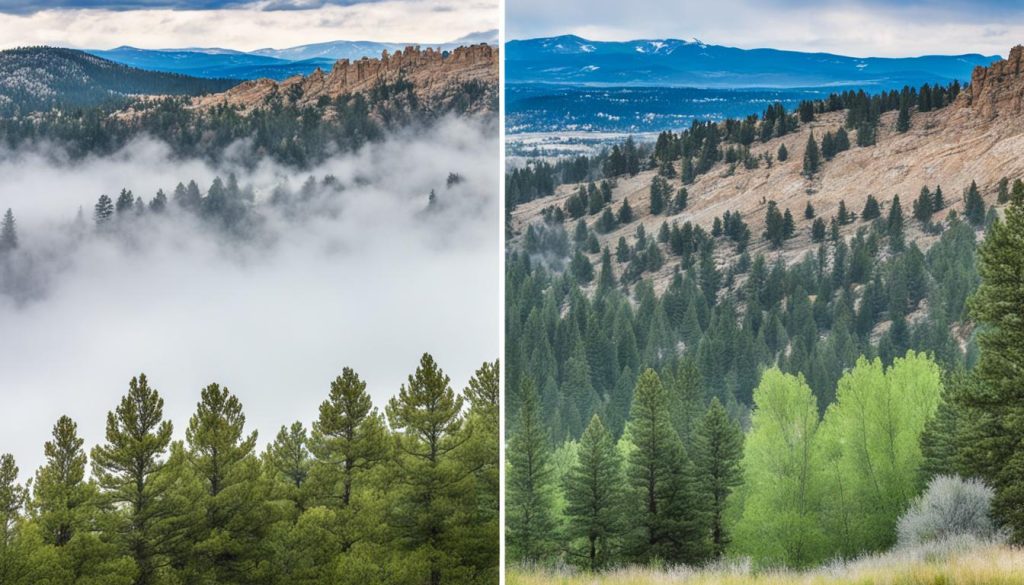
Spring in Castle Rock: A Transitional Season
The winter chill starts to fade in Castle Rock, Colorado. Spring comes, bringing mild days and the chance of snow. Spring sees big changes in weather. Warm, sunny days can turn cold and windy quickly.
When you pack for Castle Rock in spring, be ready for anything. The weather might change a lot.
Packing Tips
When packing for your Castle Rock spring adventure, think of these tips:
- Bring layers of clothing. You can add or take off clothes easily.
- Don’t forget a warm coat, hat, and gloves for surprise cold spells.
- Have a rain jacket or umbrella ready for spring showers.
- Choose comfortable, closed-toe shoes for any type of ground or weather.
- Remember sunscreen, sunglasses, and lip balm for sunny days.
Think ahead and pack smart for the changing spring weather in Castle Rock. That way, you can have the best time exploring this amazing place.
Summer in Castle Rock: Warm and Stormy
Summer in Castle Rock means a lot of heat, often over 100°F. There are afternoon thunderstorms with strong winds, heavy rain, and lightning. Hail can also fall. Despite the heat, you can still have fun with many outdoor activities.
Outdoor Activities
Castle Rock is a great place for outdoor lovers in summer. You can hike in the Garden of the Gods or explore the numerous parks and trails. The town is also lively with outdoor fun to enjoy. And for a break from the heat, there are lakes, rivers, and swimming pools around.
Packing Essentials
To enjoy your time in Castle Rock, pack smart. Bring sunscreen, lip balm, hats, and sunglasses. Lightweight clothes are a must. Don’t forget a rain jacket or poncho for surprise thunderstorms. With the right stuff in your bag, you’re all set for fun in Castle Rock.
Castle Rock, Colorado: Best Months for a Weather-Savvy Trip
The best times to visit Castle Rock, Colorado, for good weather are spring and fall. The weather is cooler, with less extreme conditions, ideal for outdoor activities. You should still get ready for quick weather changes and sometimes rain.
Ideal Time to Visit
Spring and fall are great for a visit to Castle Rock because the weather is stable and friendly. It’s not too hot or too cold, and there’s a low chance of snowstorms, hail, or intense heat. This is perfect for going outdoors and seeing the parks, trails, and attractions.
Travel Considerations
During spring and fall, Castle Rock has the best weather for exploring. But, it’s good to remember that the weather can change fast. Be sure to pack layers and stay flexible with your plans for a smooth trip, no matter the season.
In winter and summer, Castle Rock can be quite tough, with more chances for snowstorms, hail, and heat. If you plan a trip then, always check the weather forecasts. Being ready to switch up your plans is a smart move.
Fall in Castle Rock: Cooler Temperatures Arrive
The warm summer is fading, making way for Autumn in Castle Rock, Colorado. Cooler Castle Rock fall weather is coming. The once green scenery now turns into a sea of changing leaves.
Changing Foliage
Get ready to see Castle Rock’s trees light up with red, orange, and yellow. It’s a stunning sight that attracts many. In the parks, forests, or downtown, the changing leaves will make your visit memorable.
Fall brings more wind and could start snowing early. Don’t forget to pack warm clothes like a coat, hat, and gloves. This way, you’ll be ready to enjoy the Castle Rock fall weather no matter what.
Conclusion: Planning Your Trip to Castle Rock
Think about the weather when planning your visit to Castle Rock, Colorado. This area sees different weather throughout the year. Knowing what to expect helps you pack right. This way, your trip will be fun, no matter the season.
Spring and fall are great times to visit. The weather is usually pleasant then. It’s perfect for outdoor fun and seeing the sights. Just be ready for a mix of warm and cool days.
Bring clothes for any kind of weather. Spring is mild with beautiful plants. Fall is cooler and the wind picks up, but the colors are amazing.
With good planning, you can enjoy Castle Rock any time of year. This pretty town in Colorado invites you to explore its beauty. Have an amazing trip by thinking about the weather and packing smart.
